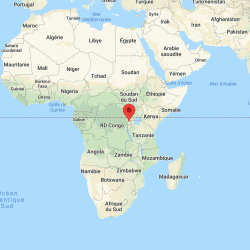
Walk a mile in Damascène Ndayisaba’s shoes
An interview with FXB Africa's Director of Operations
How did you get involved with FXB, for which you have been working in Rwanda during the past 20 years?
I am from Cyeza / Rutobwe district in Rwanda where FXB started its programs in 1995. On a Sunday of May that same year, when I was going to Kigali where I worked for a local organization supporting widows and orphans victims of the Rwanda genocide in the southern province, I missed my bus. I saw a car and two white men. I approached them and asked for a lift. The men took me on board and began to ask me several questions about myself and my work.
Throughout the journey, we did not stop talking: they really wanted to know more about my program and how we served our beneficiaries. When we arrived in Kigali, they told me that they were from FXB International and that they were going to contact me. One of them was the Executive Director at the time, Leon de Riedmatten, and the other, Head of Mission, Hedi Amami.
A few months later, I received an invitation from FXB International to join FXB Rwanda as a social worker, to develop a project similar to the one I was implementing in Mayaga. I accepted, and in 1999, I became national coordinator.
How did FXB evolve in Rwanda during the past 20 years?
FXB began with a rehabilitation program for houses destroyed during the genocide. Nearly 600 houses were built and about fifty children were placed in safe homes. In 1998, FXB launched a second project to support poor families by helping them improve their socio-economic conditions. More than 3,500 families received income-generating activities while children received school support. Among these families, we noticed the scale of HIV/AIDS infection. 500 adults were sent to the hospital for testing and unfortunately, 15% were infected.
We therefore provided support for HIV positive mothers and children affected by the disease. This program gradually evolved into the current FXBVillage Model. Today, 65 staff members work for FXB Rwanda and more than 7,000 families have been lifted out of poverty in the country.
What are you personally most proud of in your work with FXB?
Under my leadership, FXB Rwanda was awarded a first grant from US President’s Emergency Plan for AIDS Relief (PEPFAR) to launch 20 new Community Development Programs FXBVillage in Rwanda and Uganda, as well as a second grant to launch 14 additional programs. This greatly expanded our area of intervention. FXB is now present in all provinces of Rwanda. This presence and especially the impact of our programs on the local communities makes me proud, but I feel even prouder when people across the country run behind me, calling me by name and extolling the merits of FXB.
FXB is one of the few organizations in the region that goes down to the family level by providing families with a comprehensive package of services they need. Among the people who came out of extreme poverty countrywide, FXB’s contribution is quite considerable.
Some victims are living beside neighbors who have been involved in the murder of their families. How did the Rwandan genocide affect the population, more than 20 years later?
Thanks to the government’s current commitment of denying impunity and favoring forgiveness, the genocide perpetrators and the victims coexist peacefully and help one another. They all recognize that the genocide has struck, in one way or another, every single Rwandan. In fact, during the genocide, almost every family either lost one of its members, or had a relative in prison or in exile. All of us unanimously agree that it should not happen again. People who saw Rwanda during the genocide can hardly recognize that 20 years later, it is the same country. So much has changed.
What message would you give younger generations?
The genocide that struck Rwanda in 1994 did not come by itself. It was the fruit of hatred and selfishness. Education, and this is what FXB advocates for, gives us this capacity to analyze, decide and act freely, as long as it takes into account and respects our neighbor’s rights.
Younger generations must understand that evil brings no good. It’s not a matter of wisdom, morality or trauma. On this earth, I have already seen more than enough: misery and happiness, evil and good. I also encourage citizens to work for poverty eradication and fight for everyone’s most fundamental rights. Without this, our world would go straight to its loss.
How do you think FXB is contributing to a stronger and more cohesive Rwanda?
The individual and community development that FXB promotes brings all actors to partner with their neighbors to increase the chances of success of their income generating activities. Cooperatives, groups, collective activities…. it all contributes to creating a strong bond and relationship between the participants of the programs and gradually strengthen national unity: “Knitting a little piece of the peace process” as Albina du Boisrouvray, founder of FXB, used to say when she launched FXB’s first program in Rwanda. I deeply thank Albina for being among the visionaries and for acting as she did in Rwanda without waiting too long!
About Mr. Ndayisaba: Trained as a psychologist and educator, Damascene first worked as a Senior School Principal. Later, he carried out training in business management and community well-being. For the past 22 years, he has been working with FXB in Rwanda, initially as Social and Administrative Manager, and later as Country Director.
Having acquired important expertise in the socio-economic and cultural dynamics of African great lakes communities, he substantially contributed in designing the FXB comprehensive program of support targeting orphans, vulnerable children and destitute families affected by HIV/AIDS in Rwanda, that he later developed and expanded in Uganda, Burundi and the Democratic Republic of Congo (DRC)
